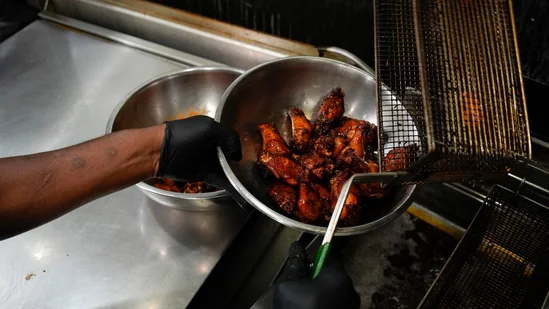Psychologists have known for years now that men tend to eat more meat than women, but a global study now reveals that that's true across cultures.
Vacationing in Chicago this week from Europe, Jelle den Burger and Nirusa Naguleswaran grabbed a bite at the Dog House Grill: a classic Italian beef sandwich for him, grilled cheese for her.
Both think the way their genders lined up with their food choices was no coincidence. Women, said Naguleswaran, are simply more likely to ditch meat, and to care about how their diet affects the environment and other people.
“I don't want to put it in the wrong way, that male people feel attacked,” said Naguleswaran, of Netherlands, laughing. She said she used to love eating meat, but giving it up for climate reasons was more important to her. “We just have it in our nature to care about others.”
Now, scientists can say more confidently than ever that gender and meat-eating preferences are linked. A paper out in Nature Scientific Reports this week shows that the difference is nearly universal across cultures — and that it's even more pronounced in countries that are more developed.
Researchers already knew men in some countries ate more meat than women did. And they knew that people in wealthier countries ate more meat overall. But the latest findings suggest that when men and women have the social and financial freedom to make choices about their diets, they diverge from each other even more, with men eating more meat and women eating less.
That's important because about 20% of planet-warming global greenhouse gas emissions come from animal-based food products, according to earlier research from the University of Illinois. The researchers behind the new report think their findings could fine-tune efforts to persuade people to eat less meat and dairy.
“Anything that one could do to reduce meat consumption in men would have a greater impact, on average, than among women,” said Christopher Hopwood, a professor of psychology at the University of Zurich and one of the authors of the paper. The work drew on surveys funded by Mercy for Animals, a non-profit dedicated to ending animal agriculture. Hopwood said he is not affiliated with the organization and is not an advocate.
The researchers asked over 28,000 people in 23 countries on four continents how much of various types of food they ate every day, then calculated the average land animal consumption by gender identity in each country. They used the United Nations Human Development Index, which measures health, education and standard of living, to rank how “developed” each country was, and also looked at the Global Gender Gap Index, a scale of gender equality published by the World Economic Forum.
They found that, with three exceptions — China, India and Indonesia — gender differences in meat consumption were higher in countries with higher development and gender equality scores.
The large number and cultural diversity of people surveyed is “a real strength of this,” said Daniel Rosenfeld, a social psychologist at UCLA who studies eating behaviour and moral psychology and was not involved in the study.





